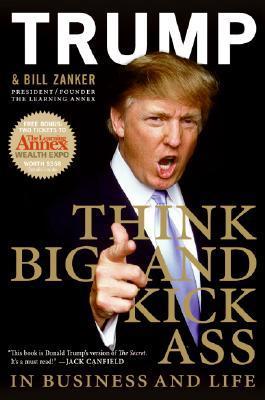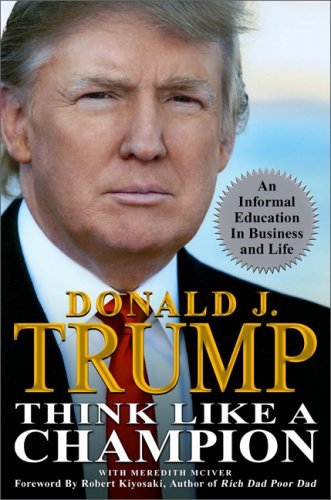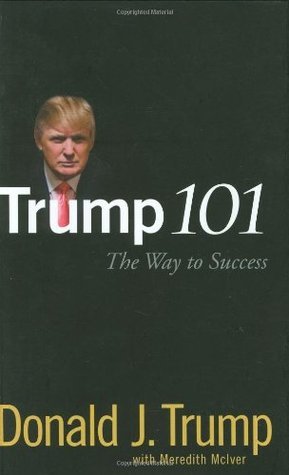
Trump: Think Like a Billionaire: Everything You Need to Know About Success, Real Estate, and Life
Book Description
Unlock the secrets of towering success with the audacity of a billionaire at your fingertips. In "Trump: Think Like a Billionaire," Donald J. Trump lays bare the strategies that propelled him to the pinnacle of wealth and influence. From mastering real estate deals to navigating the intricate web of life’s challenges, this book brims with insights that spark ambition and ignite creativity. Discover the mindset that turns visions into reality, while learning to seize every opportunity that comes your way. What if the key to your wildest dreams lies in how you think about success?
Quick Book Summary
"Trump: Think Like a Billionaire" by Donald J. Trump offers practical and motivational insights on building wealth, achieving personal success, and mastering the art of real estate deals. Drawing from his career as a high-profile real estate developer and businessman, Trump distills decades of experience into lessons on negotiation, risk-taking, decision-making, and personal branding. He emphasizes cultivating a wealthy mindset, seizing opportunities, and maintaining resilience in the face of setbacks. The book functions both as a guide for aspiring entrepreneurs and a reflection on Trump's approach to life and business. With advice covering financial management, networking, investing, and discipline, readers are encouraged to adopt strategies that foster confidence, long-term vision, and the relentless pursuit of ambitious goals.
Summary of Key Ideas
Table of Contents
Developing the Billionaire Mindset
At the heart of Trump's philosophy is the importance of thinking like a billionaire—shifting one’s mindset to embrace big dreams, self-belief, and an unwavering focus on success. He insists that attitude is everything and that aspiring winners must shrug off criticism and pessimism. By harnessing confidence, visualizing success, and believing in one's abilities, readers can establish a strong mental foundation to pursue audacious goals. Trump illustrates these points with anecdotes from his own career, showing how mental resilience and optimism enabled him to pursue and achieve high-stake deals.
Mastering Real Estate and Investments
The book deep-dives into the mechanics of real estate, revealing strategies for identifying opportunities, conducting thorough due diligence, and negotiating profitable deals. Trump discusses the value of leveraging assets, understanding market cycles, and using intuition alongside analysis. He explains principles like buying undervalued properties, renovating for increased worth, and always securing favorable terms. Practical tips include maintaining liquidity, researching neighborhoods, and being fearless yet realistic in negotiations. Trump’s real estate lessons extend to a broader context, encouraging adaptability and a long-term outlook in all investment decisions.
Strategic Networking and Relationships
Strategic networking is positioned as an essential ingredient for career and business growth. Trump advocates for surrounding oneself with ambitious, knowledgeable people and for building relationships with those influential in relevant industries. Effective communication, reciprocity, and maintaining good rapport with partners, clients, and even competitors can open doors. Trump shares examples where personal connections and trust led to key opportunities, emphasizing that success often hinges not only on what you know, but whom you know, and how you present yourself within these circles.
Managing Personal Brand and Image
Another core theme is the proactive management of personal brand and public image. Trump advises readers to take control of their narrative, project confidence, and remain visible in a crowded marketplace. He covers the importance of media presence, public speaking, and the careful curation of one’s reputation. Personal branding, Trump suggests, goes hand-in-hand with building wealth because it attracts deals, supporters, and opportunities. He encourages authenticity tempered with strategic self-promotion, illustrating how reputation fosters credibility with investors and the wider public alike.
Decision-Making and Risk Management
Finally, the book examines decision-making and risk management. Trump underscores the necessity of acting decisively, weighing pros and cons, and not shying away from bold moves. Calculated risk-taking, backed by research, intuition, and experience, can provide an edge in competitive environments. He recommends learning from setbacks and viewing failures as motivators rather than deterrents. By accepting uncertainty and navigating it with discipline, aspiring billionaires can not only survive but thrive, turning obstacles into stepping stones and ensuring long-term success.
Download This Summary
Get a free PDF of this summary instantly — no email required.





